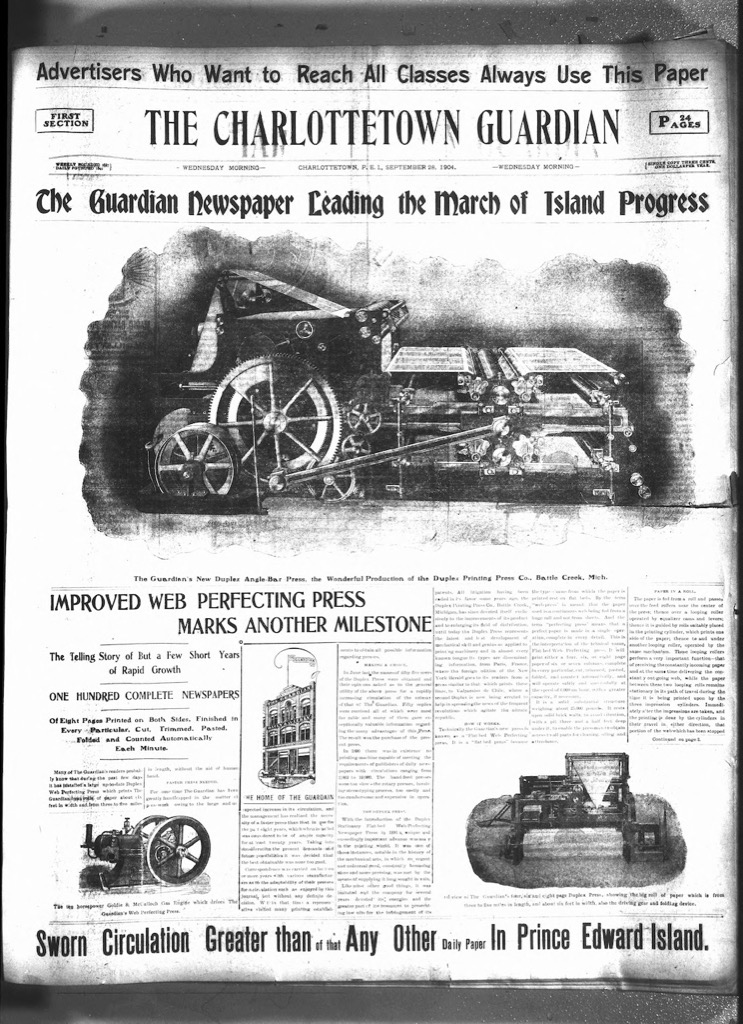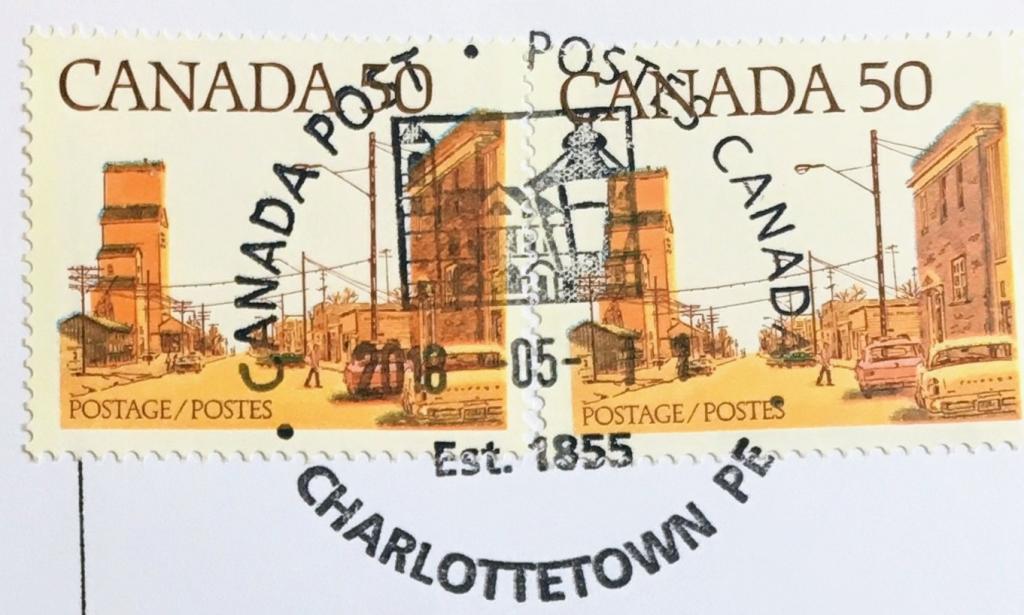Classic PEI move: missed the 6:00 p.m. ferry home at Caribou by 10 minutes. Enjoyed fish & chips in Pictou in recompense. And then got to see the sunset over the 9:00 p.m. ferry.

Ethan went visiting today. Piccolo the lab is 12 weeks old. There was much suspicion but, ultimately, détente.

Gaudet Optical in Halifax comes through for our family again. By happenstance (or fate), Catherine selected frames from Anne & Valentine, who made the frames I bought here three years ago. Service was, as then, top-flight.

The CBC is reporting that the Island’s two daily newspapers will be printed in Halifax starting this summer.
With printing moving to Halifax, the papers will have to be transported across the Confederation Bridge — which is at times closed to high-sided vehicles, particularly in the winter.
Cameron said both high-sided and low-sided vehicles will be “deployed to alleviate the challenges of winter conditions.”
One can imagine an emergency wagon train of specially equipped El Caminos plowing across the bridge to save the Island the indignity of going without (what the spokesperson identifies as) the paper’s “thoroughness, resonance and permanence” due to weather.
Prince Edward Island has a glorious printing tradition stretching back hundreds of years.
Back in November 1904, The Guardian reported that “Chas S. McDonald, Covehead, was in the city yesterday. He visited The Guardian office and saw the new press.”
That new press, a Duplex Web Perfecting Press, had been installed earlier that fall with great fanfare, with the entire front page of the September 28, 1904 edition devoted to the press, under the headline “The Guardian Newspaper Leading the March of Island Progress”:

That story continued onto page 2, where the history of the newspaper’s presses to that point was included. When the paper was founded in 1891 it was printed on “an old Fairhaven Press imported many years previously.” In 1896 it was replaced with a Cottrell Press; that press was quickly fitted with an electric motor, “the first application of electricity for power purposes in P.E. Island,” the paper reported. The was the press replaced in 1904; an invitation to “all subscribers, patrons and the general public” was extended to come and visit it.
You can sense similar pride emanating from The Guardian when, in 1929, it told the story of its own brand new Duplex Tubular Plate Rotary Press. The installation, the paper reported, “marks a period in the printing annals of Prince Edward Island.”
As, alas, does this latest move to expatriate the printing offshore. It’s sad to see the efficiencies of the Fixed Link claim another victim.
On the same day that The Guardian reports on the plight of mobile home owners about to lose their rental real estate, the 99% Invisible podcast reports on a very similar situation in Utah that was ultimately resolved when the residents, with external support, united in a cooperative and acquired the land themselves.
Shirlene and the other residents of Applewood fought for several years to stay in their homes. There were a lot of twists and turns, late nights and a whole lot of emails, but eventually, after a lot of public pressure, the development company gave up on the project, and decided to put Applewood up for sale, so Shirlene called ROC USA.
“R O C stands for resident-owned communities,” explains Paul Bradley, the President of ROC USA, “and we help homeowners in mobile home parks buy their communities as a co-op.” Bradley has been organizing mobile home co-ops since the 1980s. In New Hampshire, where ROC is based, they even got legislation passed that gives mobile home owners a first option to purchase the land whenever a park goes up for sale. Today, over 25% of mobile home parks in the state are resident-owned.
If there is any place in Canada primed for a movement like this to take hold, surely it’s Prince Edward Island, one of the cradles of the cooperative movement in the country.
I mailed a postcard to a friend up the street and had it hand-cancelled at the Charlottetown Post Office; she generously took a photo of it when it arrived.
The stamps are from a collection that was generously sent my way by an anonymous benefactor several years ago. They don’t make stamps like they used to, and it’s a joy to use them.
The cancellation stamp is beautiful; so much nicer than the stroke of a ballpoint pen.

From today’s PEI Citizens’ Alliance News:
On May 1st, a most eloquent proposal to really focus on the health of people and society—Motion 40, “Encouraging government to adopt a ‘Health in all Policies’ approach to governance.”
Peter Bevan-Baker and Hannah Bell both speak to this, and then government MLA and Economic Development Minister Chris Palmer was tasked to speak to it until the hour was called. He’s been asked to do some pieces of work—move the government’s “MMP: No or Yes” motion, speak constantly about taking the federal government’s investigation in the PNP resident scandal “seriously”, and that Tuesday night, making some of the more inane stream-of-consciousness comments about the Third Party Motion.
Sixteen minutes of Bevan-Baker, Bell, and then Palmer (with bonus snarky comments from Transportation Minister Paula Biggar) at the end; or just read it, starting around page 2226, for about three pages of text.
How heartachingly difficult it must be for Mr. Bevan-Baker and Ms. Bell to present such a well-considered, sensible motion, based on government’s own research, only to have the government response pay it no heed whatsoever, and, indeed, to belittle it with neo-liberal talking points.
Members on the government side need not agree with the ideas and motions that other parties bring forward, but to swat them away so dismissively as a distraction from the business at hand not only insults their fellow MLAs, but dishonours the spirit of collegial debate that should be the backbone of how our legislature operates.
Unfortunately this is not an isolated case: the government reaction to the Well-being Measurement Act when it was introduced in 2015 was similarly tinged.
I expect more from my government than this.
At the end of my post last week about weblogs and the GDPR I mentioned that Frank Meeuwsen had recorded a Pecha Kucha talk of mine at the Reboot conference in 2006. This, in turn, prompted a rumination by Frank about Reboot and its role in his life, further spurred on by Ton’s similar look back.
Three years ago, on the 10th anniversary of my first Reboot, I also looked back, and, rereading that post now, I realize that, as Frank and Ton realized, Reboot played an even more significant role in my life than I imagined.
You can’t go home again, and as the shadow of Reboot recedes into the past and the calls to resuscitate it fade, it is a good time to consider the larger legacy of the conference: the connections forged in its furnace, but also the social web that both allowed it to happen, powered it, and from which novel new manifestations thereof spun.
That Ton and Frank and I could consult our own blog posts from a decade or more ago as a resource for this reflection is a testament, if nothing else, to the diarizing utility of the medium.
In this spirit, I am happy to see a tentative rekindling of the social web underway. It’s not in full flower by any means, but people are dusting off old tool-chains and, with the value of distance from earlier, reconsidering how it all connects together.
For the first time in a decade, I feel like the social web might have promise against the onslaught of the re-CompuServing of the web.


 I am
I am